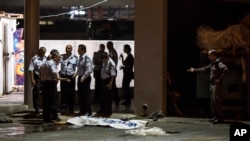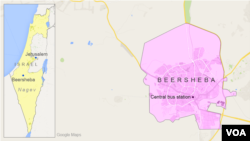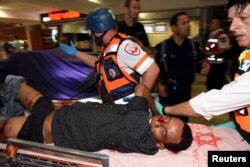The shooting death of an Eritrean who was mistaken for an attacker Sunday in Beersheba's Central Bus Station has exposed a fault line of tension concerning race, immigration and human rights in Israel.
The incident began with a terrorist attack. A gunman barged into the station, killed a 19-year-old Israeli Defense Forces soldier and shot indiscriminately at the crowd, injuring 10 other people. The suspect was later identified as Muhanad Alukabi, 21, an Israeli-Bedouin from the village of Uqbi.
As terrified passengers and onlookers at the bus station ran for their lives, the police saw Habtom Woldemichael Zerom, originally from Eritrea, who was crawling out of a corner and trying to avoid the bullets. Security camera footage at the bus station shows Habtom became a target as Israeli police officers mistook him for an attacker and shot at him repeatedly.
Wrong place, wrong time
Habtom grew up in Shambuko, a small town in the Gash-Barka Region of western Eritrea. He came to Israel in search of a better life. That day, he was heading back from Beersheba, the largest city in the Negev desert of Israel, after coming to the town to renew his temporary living permit, a document that must be renewed every two months. Israel has granted refugee or asylum status to very few immigrants, about 0.07 percent of thousands of claims from Sudanese and Eritrean refugee and asylum cases filed.
Habtom’s friend Yohannes Arefaine, known commonly as Wedi Keshi John, was traveling with Habtom at the time and said that they heard bullets as they were sitting and waiting. Their immediate reaction was to run outside. Yohannes ran outside and realized immediately he didn’t see “Mila,” Habtom’s nickname. When he couldn’t see Habtom among the crowd, he said that he immediately told the authorities that he was Habtom’s brother. The Israeli police said they needed to talk to him in private.
“They said that he was holding a knife, and I said that he wasn't. I told them that he is someone who works hard and lives here, just like me. He is my brother ... if you are saying he has a knife, it also means I have a knife,” Yohannes told VOA’s Horn of Africa service in his native language, Tigrigna.
An amateur video later showed that after Habtom was shot, a crowd of vigilantes beat him and stomped on him as the wounded man fought for his life.
Very poor condition
Yonhanan Baizel, a surgeon who is the deputy director general of the Soroka University Medical Center, spent three hours trying to save Habtom’s life. He said Habtom came to the hospital in “very, very bad condition," with wounds to his chest and abdomen, a fractured femur and a great deal of blood loss. Baizel said he thought Habtom died as a result of the gunshots, which pierced his lungs and abdomen, and not as a result of the beating he suffered afterward.
Baizel said terrorist attacks aren't common in the area. Most attacks of this nature occur in the Jerusalem area or in the Afula area in the northern part of Israel.
Baizel added that there are no specific tensions with the Bedouins, a minority that numbers about 200,000 in the Negev area. “The Bedouins around us are equal citizens. ... We provide them equal services in all the wards in our hospital, and we really try to do our best to provide them with the best medical treatment possible. There is no discrimination whatever,” he said.
Death ‘not justified’
Baizel said that in addition to Habtom, the Soroka University Medical Center had provided care to some of the victims from the bus station. But Habtom’s death in particular had moved him.
“I can tell you that I really mourned his death. His death was not justified. ... You know, the situation is very tense situation in Israel and the threshold where people react is inadequate, but the threshold is very low and people feel threatened. ... This is a behavior of the mob under the present circumstance of Israel, unfortunately.”



